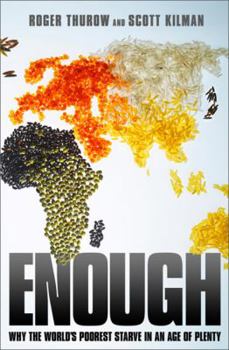Enough: Why the World's Poorest Starve in an Age of Plenty.
Select Format
Select Condition 
Book Overview
For more than thirty years, humankind has known how to grow enough food to end chronic hunger worldwide. Yet in Africa, more than 9 million people every year die of hunger, malnutrition, and related... This description may be from another edition of this product.
Format:Hardcover
Language:English
ISBN:1586485113
ISBN13:9781586485115
Release Date:June 2009
Publisher:PublicAffairs
Length:416 Pages
Weight:6.30 lbs.
Dimensions:9.5" x 1.3" x 6.5"
Customer Reviews
5 ratings
Important questions answered.
Published by Thriftbooks.com User , 16 years ago
I bought this book because I often wondered why hunger and famine couldn't be overcome in the modern world. Having read "Enough" I am now aware of many other problems besides unstable and criminal African political regimes that contribute to the food problems in Africa. More importantly though I gained a sense that the problems can be solved and that progress is being made. I think this is an important book.
Shocking ... and hopeful
Published by Thriftbooks.com User , 16 years ago
Half way through the book, you'll be mad as hell. By the end, you'll see some rays of hope. Thurow and Kilman lay out the problem: a billion or so starving or malnourished people in the world, in spite of the fact that there is enough food to feed everyone. Then they describe the barriers to getting the food to the people who need it: greed, politics, good intentions gone awry, and infrastructure/technical issues. Finally, they describe some of the ongoing efforts to overcome or end-run the barriers, and they lay out what needs to happen for the great vision of Jesus in Matthew 25 - the least being fed - to come to fruition. An important read, yet an interesting read and an easy read.
Outrage and Inspiration
Published by Thriftbooks.com User , 16 years ago
This is a terrific book. For anyone interested in ending hunger and the worst aspects of poverty, such as the RESULTS people ([...]), this is a very good book. It provides excellent background on the problem of hunger, particularly in Africa. It provides wonderful stories on specific human beings that are undoubtedly replicated in thousands of others. Some of the stories make you mad. And some of the stories make you proud, and are inspiring. We can solve hunger. This book provides answers on how to do that. Easy read, very interesting. The book will also challenge your beliefs about U.S. foreign aid, if you think it is motivated by a desire to help the poor. It will help you understand just how much of our foreign aid goes to rich U.S. corporations.
Remarkable progress in agriculture, not foreign aid
Published by Thriftbooks.com User , 16 years ago
A wonderful, readable, engaging treatise on the positive strategies for fighting hunger in a world of plenty. Basicall, the altruistic idea of "give a man a fish" does not work very well, despite its best intentions, especially if you are in the business of selling fish. Sound odd or ironic? Not really. When foreign aid in the form of free grain from American farmers arrives too late in a famine area, the local farmers are unable to sell their own product. What appears to be compassionate charity is clearly a deal to support American farmers and shippers and, perhaps only by chnace, starving Africans. The "green revolution" started in Mexico and moved to Asia and then stumbled a bit in Africa. In Africa, the absence of the social and physical infrastructure needed to promote wealth-creating, modern, efficient agriculture had a hard time materializing. And foreign aid requirements that thwarted development, by insisting on premature free-market practices in a fledgling agricultural industry, only continued the problems while exposing foreign aid for what it is: government farm support for American farmers but not African farmers. Tens of millions, if not billions in aid was siphoned off by greedy African leaders and paid to shippers for carrying grain to Africa, grain that could have been purchased for much less locally and supported local farmers. It makes American accusations of "dumping" hypocritical at best, and life-thretening at worst. Many of these case studies and stories have been published previously in the Wall Street Journal, so they will be familiar to readers of the Journal. And the authors conclude with some useful recommendations. It may seem surprising that such a compassionate treatment should come from bastion of capitalism yet, as more and more authors reveal each year, the solution to starvation in Africa is not more, free, American grain. The solution needs to be local and sustainable. "Enough" offers a bright light on the subject.
Green Revolution and Hunger
Published by Thriftbooks.com User , 16 years ago
Roger Thurow and Scott Kilman invest their considerable research and writing talents towards creating a comprehensive work on how to improve Africa's agriculture future and quality of life. Thurow and Kilman tell the stories of Africans who are making a difference in Africa: Francis Pelekamoyo in Malawi, Caleb Wangia, Gregory Wayongo and Saleem Esmail in Kenya, Eleni Gabre-Madhin, Bulbula Tulle, and Chombe Seyoum in Ethiopia, and many others. Thurow and Kilman ask us to get involved and follow the examples of Pat and Elaine in Alabama, the Rufenachts in Ohio, the students at Wheaton College, Peter Bakker in Holland, and many others.





